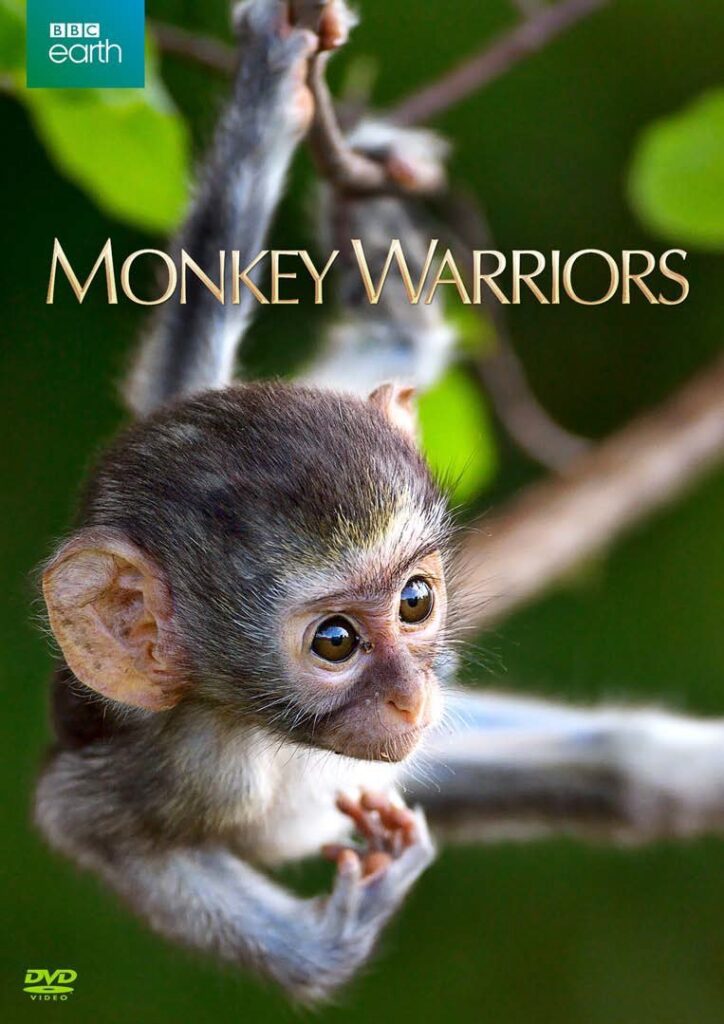
In Jodhpur, India, there’s a gang war going on. These aren’t gangs in the traditional sense, however. Hanuman Langur monkeys, displaced from their natural habitat, live on the rooftops among the people. Governed by one ruling male warlord, these monkeys often have brutal fights over territory and all-important mating rights. Their story is documented in BBC Earth’s Monkey Warriors.
Narrated by Jerome Flynn, the documentary opens with scenes of the amazingly agile monkeys seemingly flying between trees and buildings. These monkeys are long-since used to human contact and coexist relatively peacefully with them, running along the rooftops even as the people sleep there. Named after the Hindu god Hanuman, who led a monkey army against a demon of Sri Lanka, the langurs are viewed as divine creatures, sent to watch over and protect the people. That’s not to say everyone welcomes them with open arms though, as evidenced by a scene of an angry street vendor chasing the monkeys away from his fruit.
While the female langurs stick together for life, the males are eventually driven out, with one male ruling, protecting and mating with all the females. We get to witness firsthand a rival group of langurs try to overthrow the warlord but, in an impressive show of strength and dexterity, he leaps between buildings, demonstrating his physical prowess, and drives them away. The rival langurs are persistent, however, and return again later to challenge his authority.
The Indian people’s devotion to the monkeys is remarkable. On Tuesdays, worshippers gather together to honor the monkey god and many people leave food out for the langurs to eat. When one of the monkeys dies, it is given a proper funeral and cremation as if it were human, such is the respect shown to these creatures.
For their part, the langurs have many human-like characteristics. There is a definite class system in place, with lower-ranking monkeys having to remove parasites and clean the higher-ranking ones. This class warfare goes on when higher-ranked females fight to hold babies of the lower-ranked ones.
It is fascinating to watch one warlord overtake another. While the new warlord relies on other males to overthrow a rival group, he will eventually drive the other males away and go from feared tyrant to protector of the female langurs. As the langurs have a long lifespan, often reaching 35 years of age, this cycle can, and usually does, repeat itself multiple times.
Also included is the documentary Cheeky Monkey, which tells the tale of the vervet monkeys in Durban, South Africa. Narrated by Martin Clunes, Cheeky Monkey provides a nice contrast to Monkey Warriors. While the former has the Indian people worshipping the monkeys as gods, Cheeky Monkey finds the people of Durban largely annoyed by their presence.
Like the langurs, the vervets have been displaced from their natural habitats. The vervets have become very comfortable around humans and have proven to be master thieves, breaking into homes and gardens to steal food and cause mischief. While many tourists who visit find them cute and charming, ignoring warnings to not feed or interact with them, the locals have a largely different view, wishing they could be rid of them once and for all. A handful of residents are interviewed, all of who share this negative opinion of the monkeys. Some people call the police, who sometimes feed the vervets in the hope that it will deter them from stealing food.
Not everyone in Durban hates the vervets however. The documentary focuses on a rescue group known as C.R.O.W., which helps captured vervets form new groups in captivity before setting them free in the wild. Another woman who was interviewed has been feeding the same group of monkeys for 18 years, even naming them. While many residents complain that she is part of the problem, she believes she is proving a service crucial to their survival. The documentary does a good job of presenting both sides of this issue, without taking either.
The Monkey Warriors DVD shows how two sets of monkeys on two different continents, both displaced from their homes, have adapted to and thrived in city life. While one group is revered as gods and the other not so much, the langurs and vervets still have much in common. Packed with the BBC’s usual excellent film work, Monkey Warriors both informs and entertains.